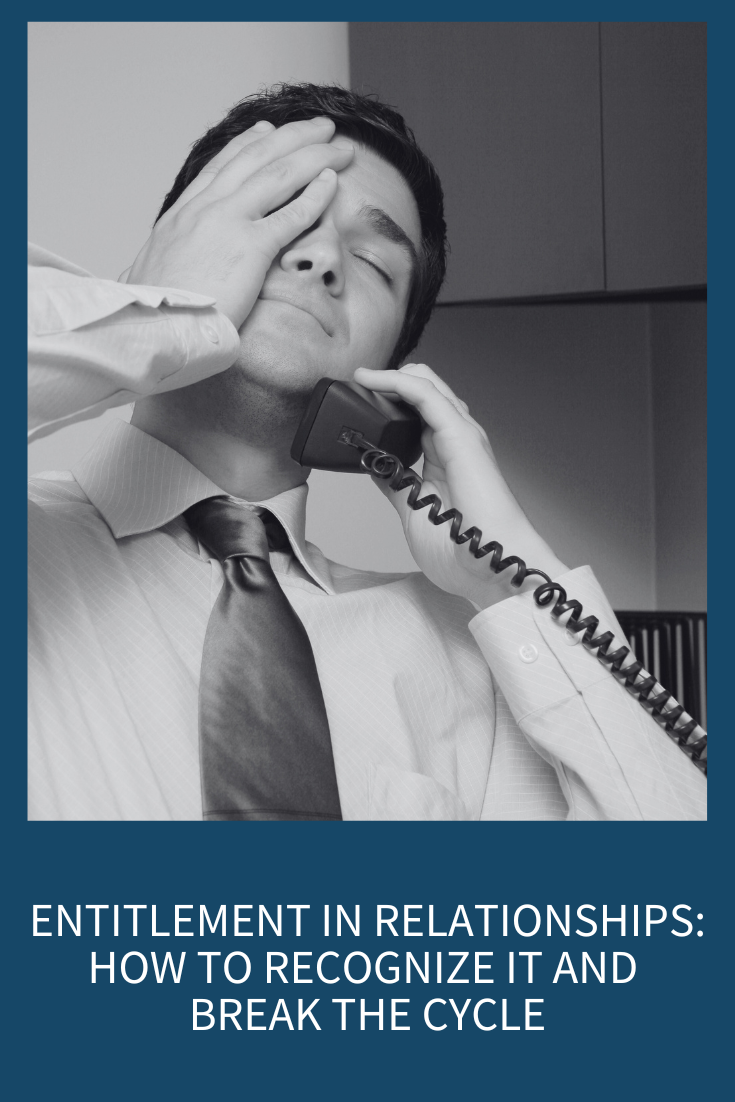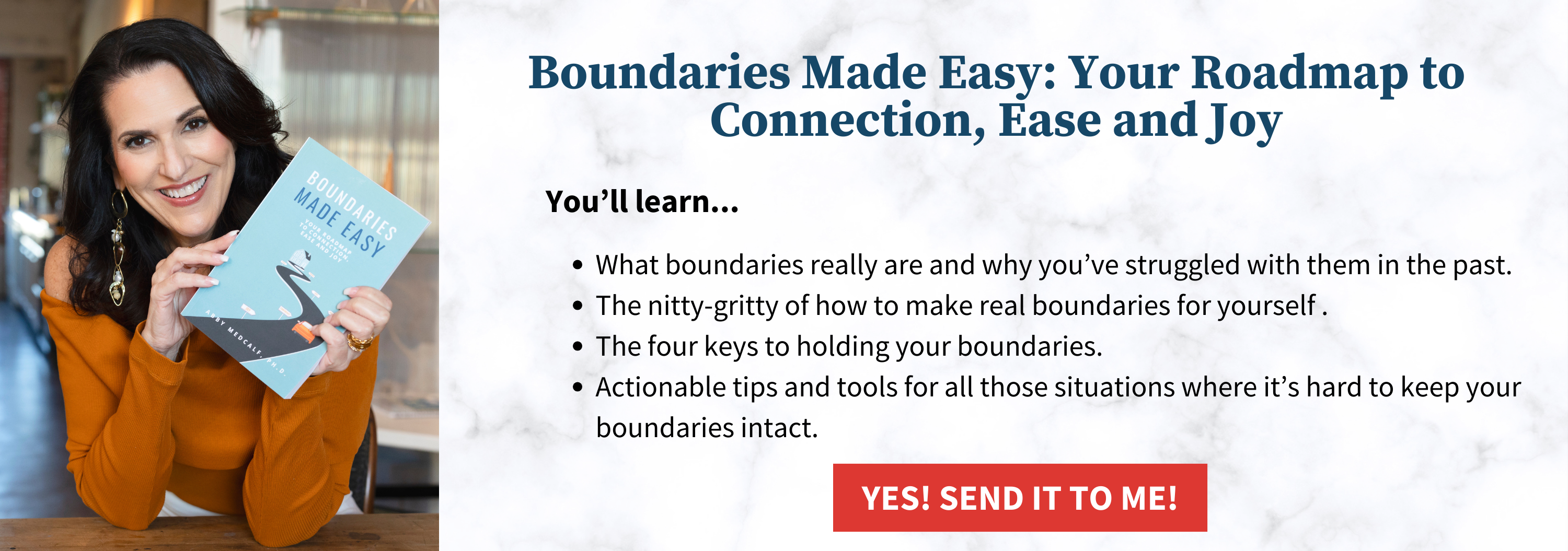
Entitlement. It’s a word we toss around casually, usually about other people. (“Did you see how she cut the line? The entitlement!”) But here’s the thing: entitlement is sneakier than we think. It can show up in the most unexpected places, like our relationships, our workplaces, and even how we navigate society at large. Today you’ll get a clear picture of what entitlement is, why it happens, and (brace yourself) how it might be showing up in your own behavior. As always, I’ll give you great takeaway tips so you can recognize it in yourself and others and break those unhealthy cycles.
15-minute read
What is Entitlement?
At its core, entitlement is the belief that you deserve special treatment or privileges, often without earning them. It can manifest as expecting others to meet your needs without reciprocation or feeling outraged when things don’t go your way. What I see the most are people who expect others to do things for them, demand special treatment, show no gratitude or appreciation for anything in their life, and want constant admiration or credit for what they do and who they are.
This might sound like some things you do or like someone you know. Entitlement is a deeply human trait, though some cultures seem to feed it more than others.
The Cultural Perspective
Here in the U.S., entitlement often looks like a natural extension of our individualism. Here, we’re taught to value personal freedom and autonomy. “You deserve it” is practically the tagline of every advertisement. The “American Dream” itself suggests that if you work hard, you’re owed success. But this can create a slippery slope. What happens when you don’t get what you think you’ve earned? Cue entitlement.
In contrast, many collectivist cultures, such as those in Asia (China, South Korea, or Japan), parts of Africa, or countries in South America (think Brazil, Columbia, Argentina, and Mexico) emphasize the group over the individual. Here, entitlement often takes a different form, like expecting family members to fulfill obligations without question. (Ever heard, “You owe me because I’m your parent”? Yep, that’s entitlement too.). For example, I’ve had many clients from India and Brazil over the years and, when their parents or family come to visit? It’s 100% expected that they’ll stay in the same house, no matter how tiny that house is.
The irony? Both approaches can breed entitlement, just in different flavors. It’s like ice cream; same basic ingredients, but the toppings vary depending on where you’re from.
What Does Entitlement Look Like in Relationships?
Entitlement can sneak into every type of relationship. Let’s break it down:
Romantic Relationships. In romantic relationships, entitlement can look like:
- Expecting your partner to “just know” what you need, without communicating.
- Feeling owed their constant attention or affection, regardless of their capacity.
- Resentment when your partner prioritizes their own needs, even if they’ve communicated them clearly.
- They expect that you’ll always go along with what they want (where they want to eat or vacation).
Sound like anyone you know? (No need to raise your hand—this is a judgment-free zone!)
Family Relationships. In your relationships with parents, siblings, and other family entitlement can look like:
- Parents: “I gave you life; you owe me everything.”
- Adult children: “You should help me because you’re my mom/dad.”
- Siblings: Fighting over who’s the favorite or who gets more inheritance (classic family drama).
- When it’s always assumed that you’ll pick up the tab, drive, or have the party at your house.
Friendships. Here, you can see entitlement show up as:
- Expecting your friend to always be there for you, even when you rarely reciprocate. This is also called emotional labor dumping.
- Feeling angry if a friend doesn’t drop everything to meet your needs. You might be busy at work and not answer a text, and then get a passive-aggressive follow up like: “Guess you’re too busy for me now.”
- They don’t take responsibility for anything. Maybe they missed your birthday but say, “That’s on you. You didn’t remind me.”
At Work. There are many ways entitlement can show up at work, including:
- Assuming you deserve a promotion just because you’ve been around a while, not because of merit.
- Frustration when your boss doesn’t shower you with constant praise for simply doing your job.
- An entitled coworker might downplay your contributions or present your ideas as their own.
- A coworker consistently passes off tasks they don’t feel like doing, assuming someone else will handle it. They say, “You’re so much better at this part—can you just take it off my plate?” without offering to help in return.
- Getting interrupted constantly with no regard to how busy you are.
- An entitled coworker might take offense to reasonable criticism and act like you’ve wronged them. After a manager points out an error, they say, “Why does everyone pick on me? Nobody’s perfect.”
Society. Entitlement shows up in the larger society (at least here in the US) in a number of ways.
- Cutting in line because “you’re in a hurry.”
- Outrage when someone doesn’t cater to your specific needs in public spaces
- Overbuying during shortages. So, during the pandemic, people would buy too much of things like toilet paper, causing scarcity that didn’t need to be there.
- Playing loud music in shared spaces.
- People who don’t queue up to get off an exit when there’s a long line and race around the line and cut in at the front.
- Treating staff, customer service, or public service workers poorly.
- Insisting people bend the rules for them. “I know the park closes at 9:00, but our birthday party will be going later than that. Can’t we change the rules just this once?”
Entitlement in Social Media and Online Spaces
- Demanding Free Content. Expecting creators to provide constant content or expertise without compensation. Someone comments, “Why are you charging for this? You should share your knowledge for free!” or “Get to the point already!” (in shouty capitals, of course).
- Personalized Service Expectations:
- Messaging a small business at midnight and getting upset when they don’t reply instantly. “I sent you a DM five minutes ago; why haven’t you responded!?”
Entitlement isn’t just about feeling deserving; it’s about expecting others to meet those feelings without question.
Why People Act Entitled
So, why are some of us more prone to entitlement than others? Let’s explore the psychological roots.
I. Learned Behavior
Entitlement can definitely be linked back to how you were brought up. Overly permissive parenting (where kids are rarely told “no”) or neglectful parenting (where children overcompensate by demanding attention as adults) are the two biggest culprits I see in my practice. There are also lots of societal messages here in the US. Too many kids are overly catered to and constantly told, “You’re special,” or, “You deserve the best.” While empowering, these messages can also backfire, creating unrealistic expectations. And don’t get me started on the “everyone gets a ribbon/trophy” fiasco.
II. Personality and Mental Health Disorders
Entitlement is a hallmark of Narcissistic Personality Disorder (NPD), where people believe they’re inherently superior and deserving of special treatment.
III. Anxiety
Anxiety and low self-esteem (which I’ll discuss in a minute) can lead to entitlement as a mechanism someone uses to compensate and protect themselves from their underlying fears, insecurities, or feelings of inadequacy. Anxiety often stems from a fear of uncertainty or a perceived lack of control over life circumstances. Entitlement can emerge as a coping strategy to mitigate these feelings. By acting entitled, someone attempts to regain control or predictability in their lives.
So, a coworker with anxiety about meeting a deadline might demand extra help from teammates, assuming their stress makes their needs more important. In relationships, an anxious partner might expect constant reassurance, feeling entitled to their partner’s undivided attention to calm any fears they’re having.
IV. Low Self-esteem
When you’ve got low self-esteem, there’s a belief that you’re unworthy, inadequate, or not enough somehow. To counteract these feelings, entitlement can serve as a defense mechanism to protect the ego from perceived threats or rejection. So, someone with low self-esteem might expect excessive praise for minor achievements, needing external validation to feel valued. Or a friend with low self-esteem might expect you to drop everything to help them because they fear being seen as unworthy of your care if you don’t.
Both anxiety and low self-esteem can make people hypersensitive to rejection. They may act entitled to others’ time, attention, or resources to avoid situations that could reinforce their fears of being unwanted or unimportant.
In Romantic Relationships:
- A partner with low self-esteem might feel entitled to constant reassurance: “Tell me you love me, or I’ll think you don’t care.”
- An anxious partner might overstep boundaries, assuming, “You should answer my texts immediately, or I’ll spiral into panic.”
In Friendships:
- A person with low self-esteem might expect a friend to prioritize them above all others, interpreting any divided attention as rejection.
- Someone with anxiety might insist on rigid plans or demand excessive accommodations during outings.
At Work:
- An anxious colleague might expect teammates to handle their tasks if they feel overwhelmed, believing their stress justifies the extra help.
- An employee with low self-esteem might seek out excessive praise for routine tasks, feeling entitled to recognition to soothe their insecurity.
Signs You Might Be Acting Entitled (I say with love)
- You frequently feel disappointed or resentful when others don’t meet your expectations.
- You catch yourself thinking, “I deserve this,” without considering whether it’s realistic.
- You struggle with gratitude, often focusing on what’s missing instead of what’s present.
Reflection Exercise
Ask yourself, “Do I expect people to meet my needs without considering theirs?” If the answer makes you squirm, congratulations, you’re human! The good news is awareness is the first step toward change.
What do you do if you’ve got a wee bit (or more) of entitlement? Here are my top four tips:
1. Practice Gratitude: Entitlement often stems from focusing on what’s missing rather than what’s present. Gratitude shifts this perspective. Try a daily practice of writing down three specific things you’re grateful for each day. Avoid generic entries like “my health” and, instead, write, “I’m grateful I had a peaceful morning to drink my coffee while watching the sunrise.”
Over time, this rewires your brain to notice the good rather than dwelling on the gaps. With your partner, instead of saying, “You never do the dishes,” try, “Thank you for cooking dinner last night. It really helped me feel supported.”
If you’re frustrated that your partner forgot your anniversary, rather than stewing, reflect on the ways they show love throughout the year. Maybe they always making your coffee just the way you like it. Gratitude isn’t about ignoring disappointments; it’s about broadening your perspective. Research shows that gratitude rewires the brain to focus on abundance rather than lack.
2. Shift Expectations to Agreements: Replace “They should know” with “Here’s what I need.” Clear communication beats assumptions every time because unspoken expectations are the breeding ground for resentment. You want to replace vague assumptions with clear, collaborative agreements.
So, instead of assuming, “They should know what I want for my birthday.” Try asking, “Hey, my birthday’s coming up! I’d love to celebrate by going to dinner at that new Italian place. Can you make that happen?”
At work, instead of expecting praise for your effort, communicate your goals: “I’d like feedback on my project. How do you think I can improve for next time?”
Or maybe you’re on a family vacation where you expect everyone to share responsibilities. Instead of simmering in silence when they don’t, sit down beforehand and say, “Let’s divide tasks so everyone gets to relax and have fun.”
3. Mindfulness Practices: When entitlement flares up, it’s often tied to frustration or insecurity. Building mindfulness can help you pause before reacting. It helps you build critical emotional regulation skills. Notice when entitlement sneaks in. Ask yourself, “Is this expectation fair?” or “Am I assuming something about this person?”
When you feel entitled resentment creeping in, it’s a great time to practice deep breathing or grounding exercises. This helps shift from a reactive state to a thoughtful response.
Have you downloaded my free mindfulness starter kit yet? Use this simple tool to start a consistent mindfulness practice.
4. Work on self-esteem by celebrating small wins and finding joy in intrinsic accomplishments rather than external validation. This means you need to cultivate internal validation. Entitlement can arise when we seek external validation for our worth. Learning to affirm yourself reduces dependency on others to fulfill unrealistic expectations.
So, you might start with some daily affirmations: “I’m proud of how I handled that challenging conversation today.” Or “I’m capable of meeting my own needs.” And/or learn to celebrate small wins. Some of my clients keep a “success journal” or place in their daily planner where they track those small achievements. Over time, this builds a sense of accomplishment that doesn’t rely on others’ recognition. Then, instead of feeling resentful that your boss didn’t compliment your hard work, you’d remind yourself, “I did an incredible job on that project, and I know it will make a difference.”
Signs of Entitlement in Others
- Persistent complaining, especially about things beyond their control.
- Expecting others to fix their problems or cater to their needs without offering anything in return.
- A tendency to dominate conversations or spaces, assuming their needs are the most important.
My Top Four Tips for Dealing with Entitled People
Managing someone else’s entitlement requires a mix of empathy, assertiveness, and boundary-setting. Here’s how:
1. Set Boundaries: Entitled people often push boundaries because they assume their needs outweigh yours. Clarity is key. Here are some solid boundary scripts:
- For family: “I know you’d like me to babysit every weekend, but I need my Saturdays for rest. Let’s find another way I can help.”
- For friends: “I’d love to help you move, but I can only stay for two hours.”
- For work: “I can take on this project, but I’ll need an extra week to meet the deadline.”
- For the urgent person: “I understand this is important to you, but I can’t help right now.”
Boundaries aren’t rejection; they’re love and clarity.
2. Use Empathy with Assertiveness: The key here is to use empathy without enabling or codependence. Acknowledging someone’s feelings can defuse tension, but it’s important not to give in to unreasonable demands.
Here are some great empathic phrases you could try:
- “I hear that this is frustrating for you.”
- “I see how much this means to you, and I want to find a fair solution.”
- “I see that you’re upset, and I want to help, but here’s what I can realistically do.”
So if a colleague feels entitled to your help every time they’re overwhelmed. Say, “I understand how stressful this project is. I can help you brainstorm solutions for 15 minutes, but after that, I need to focus on my own work.”
3. Reframe Conversations: Entitlement often comes from a narrow focus on personal needs. Reframing can help shift the person’s mindset. Here are some reframes you could try or make your own:
- With your partner: “Instead of focusing on what you feel is missing, let’s talk about what we can do to support each other better.”
- With entitled kids: “I love that you’re passionate about this, but let’s talk about how you can work toward it instead of expecting it to happen right away.”
- Maybe your teenager feels entitled to a new phone. Instead of shutting them down, say, “I get that a new phone is important to you. Let’s set a goal where you save half, and I’ll match it.”
What you’re doing in these situations is encouraging others to take personal responsibility (the kryptonite to entitlement). Entitled behavior thrives when there are no consequences. Encouraging accountability helps people understand the impact of their actions.
- “I can’t lend you money again until the last loan is repaid.” If you want help with this, I need you to show me a plan for how you’ll manage it going forward.”
- “I care about you, but I think it’s time to talk to a financial advisor or create a budget to prevent this in the future.”
- “I noticed you’ve been relying on me to complete parts of your tasks. Let’s discuss how you can manage this on your own next time.”
Encourage a “we-focused” approach. Instead of “What can you do for me?” it’s, “How can we work on this together?” But remember, never work harder than them on their issue!
4. Know When to Walk Away: Sometimes, entitlement is so ingrained that your efforts won’t make a difference. Recognizing this can save your energy and wellbeing. If someone refuses to respect your boundaries after repeated attempts, it may be time to distance yourself. Maybe this is a friend who constantly expects free emotional labor without ever reciprocating. Maybe a coworker’s entitlement is affecting your ability to do your job, so it’s time to escalate to a manager with documented examples.
If entitlement turns toxic or abusive, it’s okay to disengage.
Wrap Up
Entitlement is a tricky beast. It’s often easy to spot in others but harder to recognize in ourselves. By understanding its roots and addressing it with compassion (for ourselves and others), we can break free from the entitlement trap and create relationships built on mutual respect and gratitude.
So, take a moment today to reflect: Where is entitlement showing up in your life, and how can you shift toward a healthier mindset? The answers might surprise you, but they’re the first step to cultivating stronger, more fulfilling connections.
Addressing entitlement, whether in yourself or others, isn’t an overnight process. It requires consistent effort, patience, and a willingness to grow. But with each step, you’ll notice a shift toward healthier, more balanced relationships.
Resources and Research for Entitlement in Relationships: How to Recognize It and Break the Cycle
How to Make Mindfulness a Consistent Habit
Eight Ways to Build Your Confidence and Self-Esteem
Boundaries: How to Identify Them and How to Hold Them
Boundaries Made Easy: Your Roadmap to Connection, Ease and Joy by Dr. Abby Medcalf
Empathy in Relationships is the Key to Connection and Communication
How to Be an Assertive and Effective Communicator








